How Roche passed on a potential $14billion-a-year weight-loss pill

The Swiss company had the first option on a drug that could now become a leading anti-obesity treatment.
Swiss drugmaker Roche turned down a potential $14billion (CHF12.1 billion)-a-year weight-loss pill now being developed by rival Eli Lilly that could have given it a leading position in the booming weight-loss market, according to company filings and people close to discussions.

In 2018, three years before Novo Nordisk’s Wegovy was approved as the first weekly anti-obesity medication, Roche opted not to take advantage of its “right of first refusal” to purchase a type-two diabetes pill from Japanese drugmaker Chugai, with which it has a two-decades long partnership.
The drug – then known as Owl-833 – was ready to enter early phase-one trials and was valued at just tens of millions of dollars, two people familiar with the matter said. It was instead bought by Eli Lilly that year for an upfront payment of $50mn and became orforglipron.
The daily weight-loss pill is still in clinical trials but could be approved by 2026 and is expected to generate $50 billion in global revenues for the Indianapolis-based drugmaker in the six years after its launch, reaching $14.4 billion in annual sales in 2032, according to analyst consensus estimates.
“Roche passed up on a mega-blockbuster,” said David Risinger, a biopharma analyst at Leerink Partners.
Want to read our weekly top stories? Subscribe here.
How Roche missed out on the Eli Lilly drug – orforglipron – before eventually re-entering the weight-loss drug race five years later with its acquisition of Carmot Therapeutics shows the challenges of developing anti-obesity medications and how big pharmaceutical groups are now scrambling to buy back into the field.
Pharma groups have a history of passing on early-stage drugs which go on to become very lucrative, noted Louise Chen, an analyst at Cantor Fitzgerald.
In a recent example, Pfizer partially licensed an experimental gut disease drug to biotech Roivant Sciences in late 2022 for free. In less than a year, Roivant had sold the drug to Roche for $7 billion.
Eli Lilly’s decision to take a bet on orforglipron and fund its development shows how the biggest players in insulin-based diabetes treatments “had an edge in understanding metabolism and weight loss,” said a person close to the licensing discussions in 2018.
“Either you have the focus and expertise inside a company or you don’t, it’s not like drugs land on your desk and become a blockbuster.”
Roche has recently re-entered the weight-loss market by buying anti-obesity drug developer Carmot for up to $3.1 billion last year.
Since then, it has released early data from both an injectable and a weight-loss pill, as it bids to challenge the leading positions of Novo Nordisk and Eli Lilly, whose weight-loss injectables – Wegovy and Zepbound – are already generating billions in sales.
Companies are now vying to develop an easily scalable weight-loss pill, which would be easier to administer, in the next step to compete in the the $130 billion-a-year weight loss market.
Weight-loss pills activate similar gut hormone receptors, such as GLP-1, to the existing injectable medications, helping to suppress appetite. Analysts believe Eli Lilly is ahead in this race, thanks in large part to orforglipron.
The pill is expected to launch in 2026 and will be the only small molecule GLP-1 drug – a type of medicine based on a simple chemical formula easily reproducible as a pill – available for at least two years, giving Eli Lilly the chance to “blanket the world” with the medicine, added Risinger.
Lilly is already investing in expanding manufacturing capacity to cope with the potential huge demand for its weight-loss pills. In a mid-stage trial, orforglipron cut participants’ body weight by up to 14.6%.

More
Rising Swiss obesity levels: can new fat loss drugs like Ozempic and Wegovy help?
Rival drugmaker Novo Nordisk’s weight loss pill, oral semaglutide, is more complex to manufacture, likely hampering its rollout.
Early results from a Roche small molecule weight-loss pill last month gave users a 6.1% reduction in weight compared to a placebo, leading to excitement among investors.
Roche’s weight-loss drugs, meanwhile, are not expected to launch before 2028. Roche is set to generate just $4 billion in sales from its weight-loss injectable and pill by 2032, according to analyst projections.
However, the drugs’ patents may infringe on rival medicines, according to a regulatory filing submitted by Carmot before it was acquired.
Roche’s business development team assessed the early version of orforglipron in 2018, but concluded that “it wasn’t a priority”, according to a person close to discussions.
Roche had sold an earlier obesity drug – Orlistat – in the 2000s, as it caused gastrointestinal side effects.
After a GLP-1 drug known as taspoglutide flopped in late-stage trials in 2010, Roche reduced its investment in diabetes and obesity drugs, focusing instead on its cancer pipeline.
Gareth Powell, head of healthcare at UK investor Polar Capital and a backer of weight-loss company, Zealand Pharma, said: “There wasn’t the same excitement about weight-loss then that there is now. You have to respect [Roche] for seemingly admitting they were wrong and going after it again.”
Roche said: “Healthcare R&D is always associated with risks, prioritisation and robust decision making on where to focus investments so that they can have the biggest potential impact on patients.
“Portfolio decisions follow these principles. In 2018, neither the broader potential application of [GLP-1s] was clear yet nor was the scientific knowledge advanced as it is today.”
Eli Lilly and Chugai declined to comment.
Roche has also had big wins from its partnership with Chugai: a $4.5 billion-a-year haemophilia treatment Hemlibra, one of Roche’s biggest drugs, was licensed from the Japanese drugmaker.
Chugai, in which Roche holds a nearly 60% stake, is still set to benefit from orforglipron’s success, as it will make up to $390 million based on achieving regulatory and sales milestones.
Copyright The Financial Times Limited 2024

In compliance with the JTI standards
More: SWI swissinfo.ch certified by the Journalism Trust Initiative







You can find an overview of ongoing debates with our journalists here . Please join us!
If you want to start a conversation about a topic raised in this article or want to report factual errors, email us at english@swissinfo.ch.